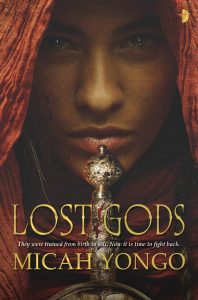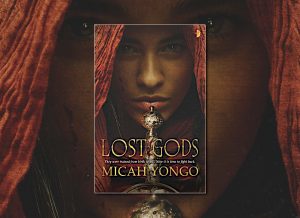LOST GODS by Micah Yongo (Book Review)
 Micah Yongo delivers an accomplished debut with this epic immersive fantasy. Lost Gods manages to convey a sweeping majestic world and yet still anchor the tale in a close and deeply personal quest. We follow his protagonist Neythan – a newly “qualified” assassin – in pursuit not only of a betrayer but also of answers to questions he doesn’t even realise he needed to ask.
Micah Yongo delivers an accomplished debut with this epic immersive fantasy. Lost Gods manages to convey a sweeping majestic world and yet still anchor the tale in a close and deeply personal quest. We follow his protagonist Neythan – a newly “qualified” assassin – in pursuit not only of a betrayer but also of answers to questions he doesn’t even realise he needed to ask.
Neythan travels through a fresh and vividly described world. With deft economical turns of phrase, Yongo puts the reader right at the heart of a non-traditional fantasy setting. The flavours and aromas of Arabia and sub-Saharan Africa permeate the text, as the story carries Neythan through walled towns, bustling bazaar-like markeplaces and diverse communities.
Yongo paints on a complex political landscape. We travel through the composite nominally secular nation of the Sovereignty bounded by the still religious Sunam to the south and the barren lands of the barbarian Kivites to the North.
Unusually for a fantasy novel – especially one so driven and carried by geography – Yongo offers us no map to augment his descriptions of place and direction. In a way this compels a deeper immersion in the story, albeit by breaking the covenant described in Diana Wynne Jones “The Tough Guide to Fantasyland.” No Tour is complete without a Map. Further, you must not expect to be let off from visiting every damn place shown on it.
It is perhaps a separate question (or article) as to whether a map is actually an essential rather than a mere convention in fantasy fiction. The mysteries of .mobi files have more than once led me to read an entire book before discovering my kindle had jumped past the helpful map in the introduction. I can’t say the omission seriously affected my enjoyment or understanding of those stories, anymore than it did with Lost Gods. (Though a map is a sop to the curiosity, once the dust has settled on the story’s denouement, to be able to scan over some geography and put people in their proper places.)
The complex strands and subplots to Lost Gods demand a multiplicity of point of view characters. At times, these different perspectives mingle with a little in-scene head hopping or seemingly omniscient narration. However, the broad threads remain distinct and distinguishable.
Neythan, the principal protagonist, bears most of the weight of the action and story. We meet him in the middle of a murderous final assessment – a graduation, if you like – in a select brotherhood of assassins. Before he or we can get too comfortable in his new role, an act of very personal betrayal shunts the story sideways. It makes an attention-grabbing driver for the action which Yongo builds steadily on, leading the reader towards a moment of recognition – if not exactly reunion – almost as iconic as the closing scene in the film “The Killing Fields.”
While Neythan is embroiled in chasing down his personal demons with the aid of some acerbic and cantankerous company, Yongo fleshes out the detail of an intricate landscape of backstory and world history through other eyes. In Dumea, Yasmin – wife to a provincial governor – is persuaded into a bold excursion across the border by the promise of secret information about her estranged brother. In his tower, Sidon – the boy Sharif, newly made ruler of the sovereignty – struggles with responsibility and impending marriage. His overbearing mother has agendas and concerns of her own, and one of Neythan’s classmates weaves his own bloody path between duty and family. Others too take their own smaller turns in the centre-stage spotlight.
Yongo’s writing gives distinctive voices to these varied personae while the variety of points of view enable him to maintain pace and tension while each strand builds towards a cliffhanging chapter ending before we are swept away to a different place and person.
There is one particularly resonant sequence depicting Neythan’s first experience of alcohol – the dulling of perception, the blurring of recollection, a smear of images, all captured vividly in Yongo’s prose.
A tapped pan drum and bells and cymbals, the almond-skinned girl pulling him to dance, Neythan falling back down. More wine. The steady thud of the drum, shrugged shoulders and raised hands, all bouncing in time.
As with all great epic fantasy, this first volume answers some of the questions posed in its opening sequences but in so doing sets new conundrums to carry character and reader on into the next book. Yongo balances expertly the demands of character and world, writing and plot. All the elements combine together in a beautifully told story of sharply conflicted people entangled in an enthralling mystery across the breadth of a fascinating new world.
In Yongo’s colourful world of nuanced characters, even by the end of the novel one is unsure who are the good guys and who are the bad – or how long either may deign to remain in those classifications. But that ambiguity is just part of the delicious puzzle Yongo has set and into which a reader can comfortably relax and be entertained.

